Premium Only Content
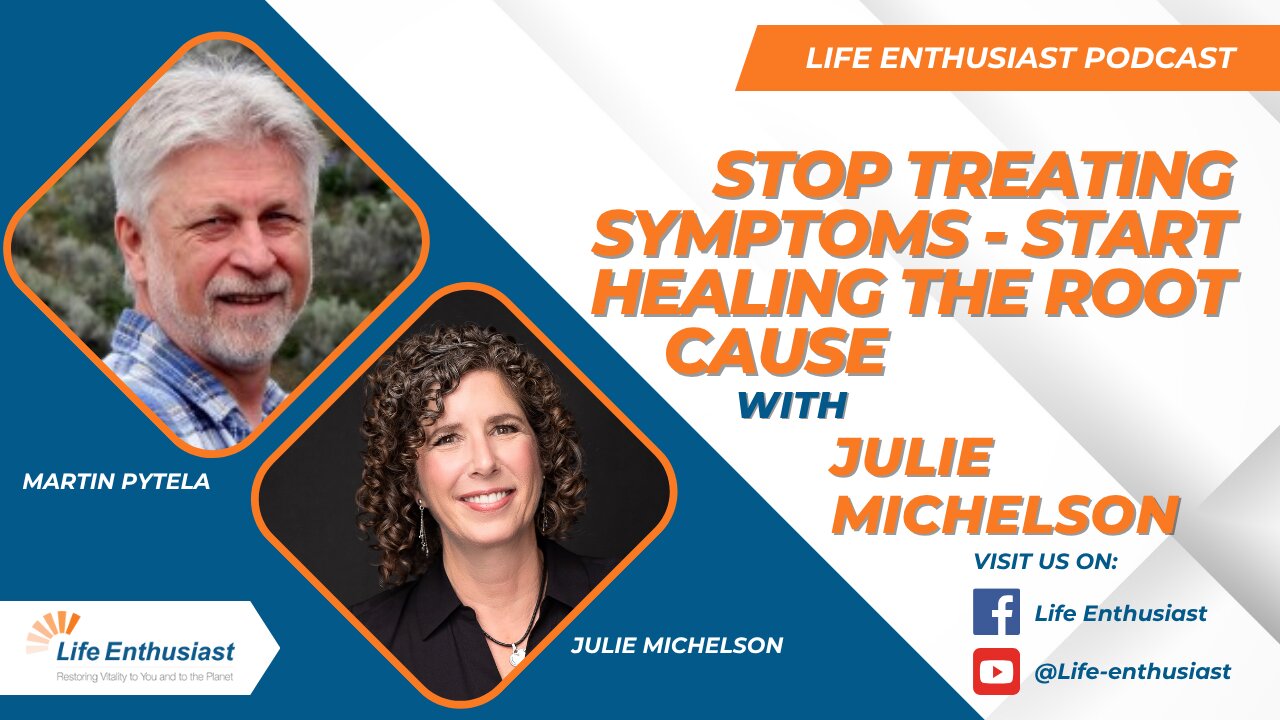
Heal, Don’t Just Cope: Julie Michelson’s Battle Against Autoimmune Pain and Mainstream Medicine
When Julie Michelson was diagnosed with rheumatoid arthritis in her early 30s, the outlook given by her doctors was bleak. As a newly single mom with three children under five, Julie faced a future filled with medications and the belief that she would steadily decline. For over a decade, she followed the conventional advice, taking prescription after prescription—ten at one point, including medications to counter the side effects of other drugs. Like so many struggling with chronic illness, she treated symptoms, not root causes.
Julie’s story, shared in an insightful conversation with Martin Pytela of the Life Enthusiast podcast, is a testimony to the transformative power of a different approach: taking charge, asking the deeper “why,” and experimenting with holistic healing.
Treating More Than Symptoms
The prevailing medical model in Julie’s journey—treating symptoms with pills—failed to halt her decline. Martin and Julie both pointed out that mainstream medicine excels at acute and emergency care but falls short when it comes to preventing or reversing chronic disease. “They know what to do if you need emergency surgery,” Julie admits, “but they’re horrible at maintaining health.”
What was missing in Julie’s care, and is too often neglected in chronic disease management, was a search for the “why.” Why does the body manifest symptoms like pain and fatigue? Why is the immune system attacking itself? This missing question, Julie says, is the difference between treating a fish for sickness and cleaning the whole aquarium.
A Turning Point
Julie's mindset shifted when, after 11 years of decline, her youngest daughter expressed fear about losing her mother. Promising to “try everything,” she realized she’d only tried everything the medical system offered. She started trying things doctors had dismissed—beginning with diet changes. Having previously gone gluten-free due to her son’s celiac diagnosis, she noticed even minor improvements in pain when she eliminated certain foods.
From food, she moved to meditation and stress management, and gradually, her health improved beyond what any medication had achieved. Despite heavy toxin loads (mercury, lead, mold, and more), focusing on nutrition and mindset got the ball rolling—proof that even small changes can crest the biggest hills.
Why Mindset Matters
One of Julie’s greatest lessons as a health coach is that healing begins with mindset. If someone fully identifies with their diagnosis, believing decline is inevitable, improvements become unlikely. She now starts every client relationship by addressing mindset, encouraging people to see themselves as capable of wellness, not destined for a life of suffering.
It isn’t necessary, Julie stresses, to be a health coach or spend thousands of dollars on tests and supplements. Simple changes—a shift in thinking, better food, a more supportive environment—can move the needle. As Martin points out, healing is about addressing the terrain, not just targeting symptoms.
Whole Foods, Real Change
Julie emphasizes the importance of whole, unprocessed foods. “What you identify as food, if it’s not real food, your body does not identify as food—and it’s part of the problem,” she says. It’s less about rigid rules and more about crowding out processed foods with nourishing, real meals.
She also acknowledges that change is hard, especially for “high achievers” who often become her clients. Flexibility and personalization, she says, are key. Whether it’s finding a private chef or building new habits one small step at a time, the most important thing is to just start.
Coaching for Accountability and Support
Trying to heal solo is slow; having a coach is a shortcut. “We’re designed to be team creatures,” Julie says. Healing is faster with accountability, encouragement, and someone who can help you identify which changes will have the biggest impact.
Julie's journey from likely decline to vibrant health—free of medication and symptoms—demonstrates that, far from being irreversible, autoimmunity can be addressed with the right tools, mindset, and support. As she and Martin agree, you don’t have to wait for the wall to come crashing down before you start making changes. Listen to your body, be willing to experiment, and know that real, lasting healing is possible.
For more insights or to start your healing journey, visit Julie at JM Coach.
Timestamps:
00:01 Introduction to Martin, Julie Michelson, and the MTHFR genetics discussion
01:13 Julie’s personal story and rheumatoid arthritis diagnosis
02:09 Decline in health, prescription stacking, and medication side effects
03:02 Life impact: quitting work, family challenges, promise to daughter to try everything
04:39 Frustration with mainstream medicine; focus on symptom treatment
06:01 Julie’s medical turnaround: now symptom-free, off medications
07:08 Medical system limitations and the value of humility
07:32 Julie’s path to healing: podcasts, experimentation, dietary changes
09:06 Starting healing with food and stress management despite a heavy toxin load
11:26 The body’s design to heal; Julie is not an exception
12:05 Julie’s coaching focus and ideal clients
14:00 The foundation of healing: addressing mindset
17:03 Importance of a holistic approach: food, toxins, sleep, stress, movement
18:30 Martin’s four pillars: toxicity, malnutrition, stagnation, trauma
19:31 Individualization in supplements and diet
21:07 Avoiding processed/refined foods and problematic dairy
23:12 Julie’s coaching style: mostly conversational and remote
23:43 Working with high achievers and unique client needs
27:37 The real costs of health: lifestyle spending versus healthcare spending
28:44 Food quality, societal differences, and “voting with your dollars”
31:09 Mini-course offer and where to start in making a change
32:51 Martin recaps Julie’s story: from disability to thriving
34:32 Addressing root causes over symptoms; symptoms as body signals
36:28 The role of coaching, accountability, and community
36:53 Social connection as a key to wellness
10 Questions Discussed In This Episode:
1. Julie Michelson talked about her experience with rheumatoid arthritis and mainstream medicine’s approach. What were some key limitations of conventional treatments that she highlighted?
2. The episode dives into the MTHFR genetic cluster and its connection to “poor methylation” and high achievement. How do Julie and Martin view their genetics as both a challenge and a gift?
3. Julie mentions she spent years declining on medications before discovering other options. What finally motivated her to seek alternative solutions, and what mindset shift did she experience?
4. The conversation emphasized the importance of addressing root causes versus treating symptoms. What examples did Julie and Martin give about symptom management versus true healing?
5. Food and nutrition played a big role in Julie’s recovery. What dietary changes were most influential for her, and why did she initially feel those ideas were “crazy”?
6. Julie discussed non-food aspects of healing, like meditation, sleep, movement, and addressing trauma. How do she and Martin view the interaction of these lifestyle factors in chronic illness recovery?
7. The topic of functional medicine came up. What criticisms did Julie have about the current state of functional medicine, and what advice did she offer for those seeking help?
8. Mindset was a recurring theme. Why does Julie believe mindset is so foundational for healing, and how does she help her clients shift it?
9. Julie emphasized that healing is individualized and that there is no “magic pill.” What examples did the hosts give about tailoring treatment or lifestyle changes to individual needs and circumstances?
10. The social and coaching aspect was highlighted at the end. According to Julie and Martin, why can having a coach or support system make such a significant difference in someone’s healing journey?
Fun Facts:
1. MTHFR "Superpowers":
Both Martin and Julie share the MTHFR gene variant, which means they're "poor methylators," but also often super high achievers—usually smart, talented, and extremely committed to making great things happen.
2. Julie’s Health Turnaround:
Julie was a single mom of three kids under five when she was diagnosed with rheumatoid arthritis in her early 30s. Doctors told her she would only decline, and she spent 11 years on 10 prescriptions. She ended up completely symptom-free and medication-free by changing her lifestyle!
3. Stacking Pills for Symptoms:
Mainstream medicine often treats symptoms instead of causes, which can lead to a cascade of pills, some just to treat the side effects of the other pills.
4. Food as Medicine:
Julie noticed her pain improved not from medications but after changing her diet, starting with going gluten-free. Later, removing nightshades and dairy (she grew up in a dairy family!) made a big difference for her autoimmune symptoms.
5. Podcast Healing:
Julie credits podcast listening with being a huge spark in her healing journey, leading her to try things outside conventional medicine, e—even the ones that sounded “crazy” at the time.
6. The Dairy Dilemma:
Julie’s family was in the dairy business, but dairy turned out not to be her friend. She highlights that humans are the only animals that drink another animal’s milk, and she now only tolerates some goat and sheep cheeses.
7. Not Just One Thing:
Both Martin and Julie stress there isn’t “one” magic fix; the keys to healing are multifaceted and often involve addressing food, toxins, trauma, movement, sleep, and more.
8. High Achievers with Autoimmunity:
Julie focuses her coaching on high achievers—not because it’s easier, but because she loves the challenge of helping people with busy, unconventional lifestyles incorporate wellness routines that fit their lives.
10. Homemade Food Wins:
Both hosts agree real, whole foods—like those prepared 150 years ago—are far better than today’s ultra-processed, chemically-laden foods. They joke about how milk is supposed to last a day, not three months!
11. Europe vs America:
Martin points out that in Europe, food is more expensive and healthcare is cheaper, because people invest in better food quality and real ingredients, which helps keep them healthier.
12. The Power of Teamwork:
Healing and lifestyle change are much more successful with accountability, support, and community. As Julie says, “We are designed to be team creatures.”
Healing is Possible at Any Stage:
Even if you feel like the “wall has come down all over you,” it’s still possible to heal—even faster and easier if you start listening to the early signals from your body.
Connect with us:
Website:
https://www.life-enthusiast.com/
https://www.life-enthusiast.com/articles/product_brand/exsula-superfoods?ref=005
Facebook:
https://www.facebook.com/LifeEnthusiastContact
Twitter:
https://twitter.com/lifentco
Youtube:
https://www.youtube.com/user/lifentco
Rumble:
https://rumble.com/user/lifeenthusiastcoop
Telegram:
https://t.me/lifentco
#LifeEnthusiast #health #wellness #podcasts #education #homeopathy
#HighQualityIngredients #NextLevelHealth #SupplementSupport #HerbalHealing #HollisticWellness #NaturalRemedies #AlternativeHealth #TraditionalMedicine #HealthJourney #WellnessSolution #HealthAndWellness #HealthyLiving #HealingPath
#MartinPytela #ScottPaton
-
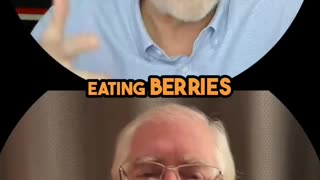 0:49
0:49
Life Enthusiast
9 hours agoSeasonal Eating: Embrace Fatty Foods & Fruity Delights!
91 -
 30:58
30:58
SouthernbelleReacts
2 days agoWe Didn’t Expect That Ending… ‘Welcome to Derry’ S1 E1 Reaction
57 -
 13:51
13:51
True Crime | Unsolved Cases | Mysterious Stories
4 days ago $0.15 earned7 Real Life Heroes Caught on Camera (Remastered Audio)
190 -
 LIVE
LIVE
Total Horse Channel
10 hours ago2025 IRCHA Derby & Horse Show - November 1st
24 watching -
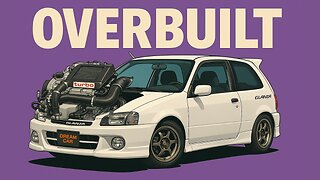 4:19
4:19
PistonPop-TV
6 days agoThe 4E-FTE: Toyota’s Smallest Turbo Monster
36 -
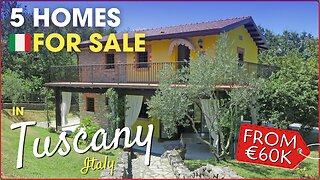 43:07
43:07
WanderingWithWine
5 days ago $0.04 earned5 Dreamy Italian Houses You Can Own Now! Homes for Sale in Italy
622 -
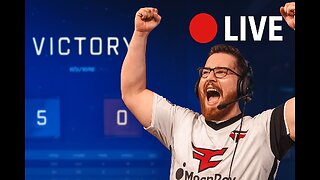 LIVE
LIVE
Spartan
18 hours agoFirst playthrough of First Berserker Khazan
324 watching -
 28:01
28:01
Living Your Wellness Life
2 days agoTrain Your Hormones
2.92K -
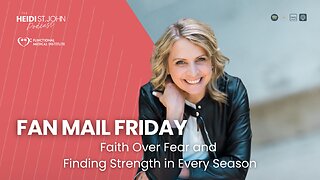 43:28
43:28
The Heidi St. John Podcast
1 day agoFan Mail Friday: Faith Over Fear and Finding Strength in Every Season
1.13K -
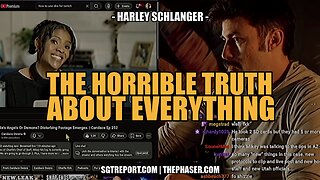 1:05:30
1:05:30
SGT Report
1 day agoTHE HORRIBLE TRUTH ABOUT EVERYTHING -- Harley Schlanger
41.1K81